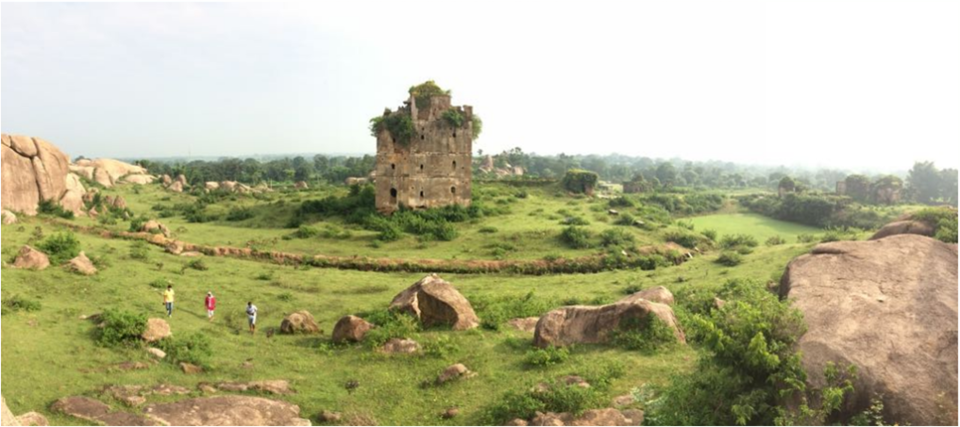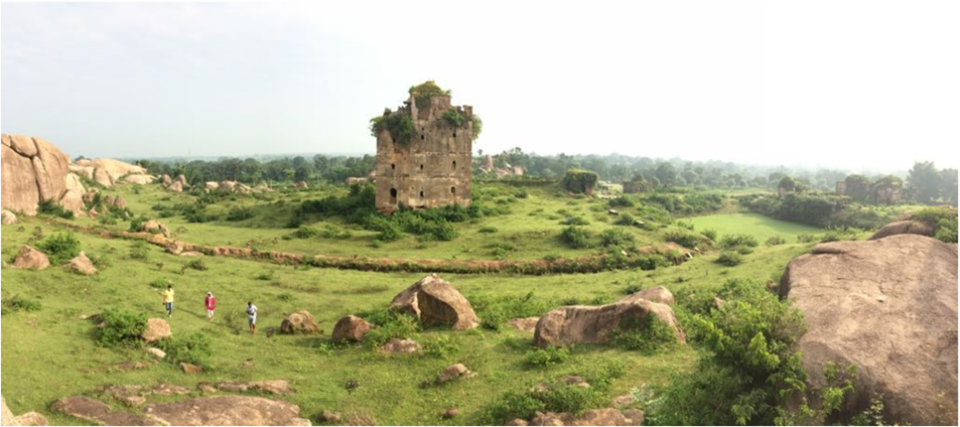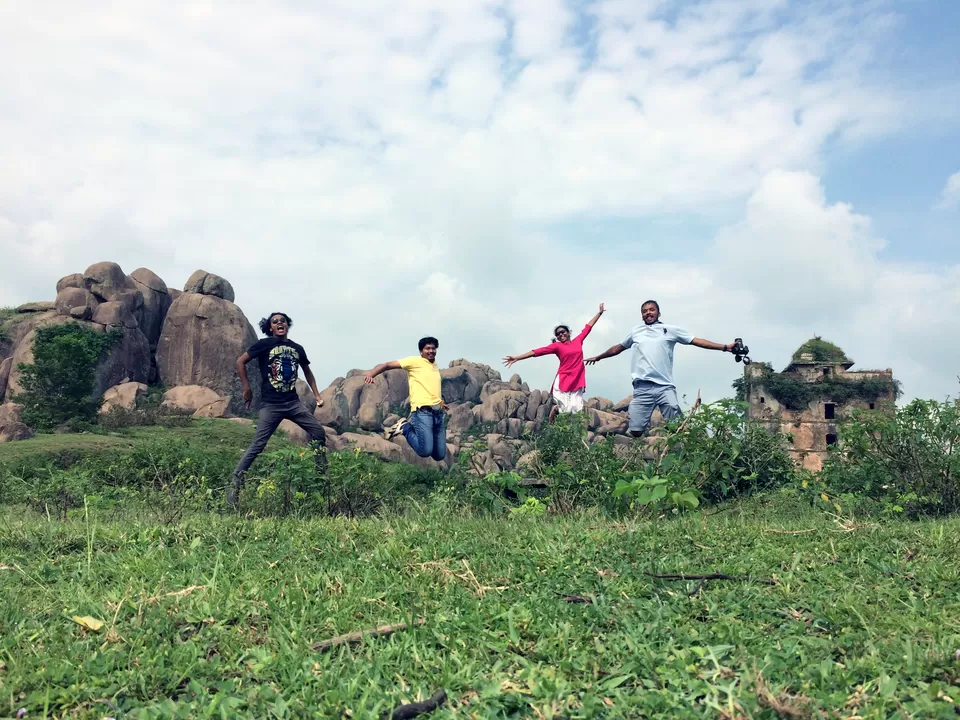
Every city has a tale to tell but here once was a kingdom and now is lost in ruins and all the tales are lost in these stones.

This region remained untouched in their isolated mountain fastness. Walled off from the outside world by chains of wooded hills.The long immunity from hostile disturbance enabled the tribes to build up their own social and administrative organizations and by 5th Century AD they had their first Nagvanshi Raja.
The Mughal invasion had started in Indian subcontinent in the year 715 AD but it took a long time for them to reach the state of Jharkhand. The Chotanagpur plateau was referred to as ‘Jharkhand’ during the Turko-Afgan period (upto 1526) till then it was free from any external influence and was addressed as ‘Kokhra’ and it was the ruling king’s head quarter. It is only with the accession of Akbar to the throne of Delhi in 1556 that Muslims influence penetrated Jharkhand.
Another reason behind the invasion was the acquisition of the diamonds found in the bed of the river Sankh in the region. Due to its diamonds Chotanagpur was also known as ‘Heera Nagpur’ and its Raja Durjan Sal, being an expert of diamonds, was known as ‘Heera Raja’ among the people. Who initiated the Navratnagarh Palace in the late 1630 s.
Thus to subdue the Raja of Chotanagpur and to acquire valuable diamonds, Jahangir decided to invade Chotanagpur. It was in the year 1616 when Ibrahim Khan invaded Jharkhand and captured the king . He was imprisoned in Gwalior with other Hindu kings where he was very influenced by them.

In the year 1628 after 12 years of imprisonment, the king was released as a reward to successfully distinguish the real diamond from a flase one. As a reward he also requested the Emperor to release few more kings whom he befriended during the imprisonment. As a return these kings visited Raja Durjan Sal when they found him living in a simple house with his people and regular lifestyle unlike the palace royals.So as a homage they sent their architects, masons, marbles and other materials for the construction of a palace for the Raja Durjan Sal.

So today what we see is the result of this story. The whole area is spread over between 25 – 28 acres. The complex comprises of various structures. First and prominent one is the 5 storied palace known as ‘Navratna Palace’. Mughal architectural elements are evident with wood work and carvings in the building. The entire structure was built with clay and stone and wooded flooring.Once it was a 5 storied structure now we can only see 3 stories.



There's pond next to this palace with steps to descend.


Next to pond is a hexagonal shaped temple made of brick and lime surkhi and yet another place which houses rooms and courtyard and there are staircase that leads to the floor above it's the Rani Lukai palace where the queen used to play hide and seek.


In the same proximity there are few more structures of which 2 are temples which follow the North Indian architectural style.It consists of mandapa& garbhagraha.

There's a stone temple nicely chiseled and shaped and it's texture stands out and still has it's charm.It was once surely a double storied structure of which only a part remains and partially it has submerged in the ground.



There are inscriptions written in ancient language used then.


There's a two storied structure on top of the hillock unknown of the usage but it stands distinct and is made of brick and lime surkhi. It has conical shikhara.




This Palace complex is not limited to the area that is visible but there are many more structures during the Nagavanshi rulers and is spread around in the nearby areas.



Though stepped wells were used in the northern India as there was scarcity of water, we found one here which has a well on one side which is still in use by the villagers. Probably of 1711 as the inscription says.





Moving on we found another temple with a dome roof and not just one dome but there's one dome above the other, one of it's own kind to seen anywhere in India.It has again the stone pillars and stone walls.




We came across another temple presently painted with the local chuna which has Bengal style of roof standing on a high platform.

These are not the only monuments, while standing on the hillock near Navratnagarh Palace, we saw yet another structure on a mountain top and were curious to see that as well. It wasn't clearly visible to the the bare eyes so we took help of google earth and confirmed that there definitely stands another structure of interest.

We navigated our way with the help of the villagers and reached close, now we could see the structure clearly on the hilltop.

To reach there we had to leave the car and we started trekking on top, villagers were unaware of the history of this structure. But as we climbed we could see recognize that once there was a boundary wall made of stone and brick on the hilltop.


The hill had a steep slope and as we reached to the top we were amazed to see the mix of north Indian Architectural style and the Indo-Islamic style. We were not sure about the usage of the structure probably a watch tower and citadel.



It has arches, Charchala roof (Bengal architecture) , conical dome , broken minarets and also dome with hexagonal base. It was built of local stones and bricks.




And not to miss the view from this place was mesmerizing, we could see all the shades of green in those rice fields, hills covered with forests and the clear blue sky.

On coming down we had a little talk with the villagers and they could not tell us anything about this structure. So we moved on knowing we have covered this place thoroughly. As we were returning we stopped by looking for the route and thought of visiting the village as well when we go to know about an unknown structure which is a temple not in use and called as 'Anaam Math'.

Looking for it we drove on the unpaved roads and finally could see not just a structure but a monument in the middle of the field.


It was so much influenced with the Northern style of architecture of India, it has stone pillars, carved, the roof made of stone slabs, the floral carvings on the stone, all of it was so much like Hampi, Karnataka. It's unknown, it's unrevealed, it's all lost in the forests.




We could only think that it would be a part of the Nagavanshi kingdom lost in the forests and preserved naturally.
So here we are, by the end of the day we had so many stories, we unveiled many more monuments than known and realized and we have so much more to explore and learn. There are more unpaved roads to ride, unveiled storied to find and unmeasured distances to cover 'beyond the forests' of Jharkhand.

For more information visit the website: https://beyondtheforests.godaddysites.com/
To know more about the history and architecture of Jharkhand follow on instagram: https://www.instagram.com/beyondtheforests/
